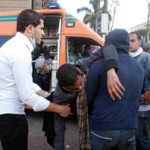
Ambulance drivers and paramedics say they do not have adequate protection, insurance or job security, despite facing increased risk and hostility in the year since a popular uprising toppled former Egyptian President Hosni Mubarak.
“We have been more prone to violence and aggression after the revolution,” Ahmed Mohamed, a 34-year-old first aid responder who works with the Ministry of Health, told IRIN. “It is becoming common for us now to be attacked, injured or even killed.”
People like Mohamed have been at the centre of violent clashes over the last few months – between civilian and military policemen, and protesters demanding the vision of the revolution be upheld. They have braved gunfire, teargas, and birdshot pellets (which cause serious injury but do not kill) to reach victims and take them to hospital for treatment.
Hundreds went on strike late last month to demand medical, social and life insurance, and permanent positions. The strike lasted about two weeks before participants cut it short to respond to renewed clashes in Cairo on 4 February.
In the eye of the storm
When tens of thousands of protesters took to the streets in January and February 2011 to demand a change of government, Mohamed was in the central protest area, Tahrir Square, like his colleagues in other cities like Suez and Alexandria, to offer help to victims. They saw people shot in the head; others in the eyes.
But they, too, came under repeated attack. Ambulance crews were attacked for money or equipment, and first aiders believe the culprits are former inmates who escaped during the revolution and are still at large. (The Ministry of Interior estimates them to be about 4,500).
In an atmosphere of increased fear and suspicion in Egypt, first aiders have also been met by aggressive behaviour from the families of victims they treat, accused either of being part of the conflict or of not doing enough to save their loved ones.
When Mohamed and some of his colleagues rushed to Tahrir Square on 4 February to help a victim of clashes between protesters and policemen following fatal soccer riots in the Mediterranean city of Port Said, he was insulted by the relatives of the victims at a nearby hospital, who accused him of arriving too late.
“Emergency workers take no sides and people need to understand this,” said Mohamed Mohei, the Emergency Section coordinator at the Egyptian Red Crescent. “If an emergency worker is attacked or injured, he will not be able to offer help to anybody.”
Risks
Ahmed Mohamed is one of 7,000 emergency aid responders working for the Egyptian Health Ministry. None of them has insurance.
“This means that if I fall ill, I need to pay for my treatment,” said Alaa Aly, another first aider. “I have been doing this in fact since I started doing this job three years ago.”
A colleague of Aly from the Nile Delta Governorate of Monofiya died about three months ago after getting into an accident while rushing victims to the hospital in an ambulance. Because emergency workers do not have the right to any type of pension, his family now depends on charity to live, Aly said.
One aid responder told IRIN he had to pay for his uniform. Another said that if he gets into an accident while driving an ambulance, he has to pay for the damage himself.
“Some of our colleagues have contracted serious diseases like hepatitis C,” said Saudi Diab, another first aider. “How can you avoid contracting diseases when you have to be close to human blood all the time?”
Blood tests
So far, the government has shown little sympathy for the demands of the emergency first aiders. It responded to the strike by running advertisements in newspapers about vacancies for emergency aid responders and is now requiring all emergency responders who want permanent positions and insurance to undergo blood tests first. The responders, who underwent tests when they first started working, fear they have acquired diseases on the job and will be dismissed if they test positive.
In an interview with IRIN, Khalid Al Khatib, head of the Emergency Section at the Health Ministry, acknowledged his staff worked without permanent contracts or insurance, but said the Health Ministry was not to blame.
“This was a state policy in the past. The nation’s administrative system is crippled with too many workers, but we promise that we will give the aid responders permanent contracts and insurance as soon as the government tells us that it has the budget necessary for this. The aid responders are doing a great job in fact.”
Trauma
Ahmed Mohamed, the Health Ministry responder, sees a lot in the course of his work. He remembers trying to save a road accident victim in Cairo. When he got to the site of the accident, he saw some of the man’s body parts scattered all around the place.
“Things like this happen to me every now and then,” Mohamed said. “The clashes that have been on the rise after the revolution between demonstrators and policemen leave a large number of victims behind. Some of these victims are in a critical condition. Death has actually become an intrinsic part of my job.”
According to Salah Hozayen, a leading psychologist from Ain Shams University, the consequences for aid responders include compassion fatigue, acute stress reaction and post-traumatic stress disorder. “This makes psychological intervention for these workers indispensible.”
But while Mohamed has shown symptoms of post-traumatic stress disorder, he has never heard of psychological intervention.
“I fail to sleep at night after a tragic incident,” he said. “Sleeplessness is becoming part of my job too.”
IRIN News
ae/ha/cb
Theme (s): Conflict, Health & Nutrition, Human Rights, Security,
[This report does not necessarily reflect the views of the United Nations]
